
Laurence Kerr Olivier, Baron Olivier was an English actor and director who, along with his contemporaries Ralph Richardson and John Gielgud, was one of a trio of male actors who dominated the British stage of the mid-20th century. He also worked in films throughout his career, playing more than fifty cinema roles. Late in his career he had considerable success in television roles.

Sir Alan Arthur Bates was an English actor who came to prominence in the 1960s, when he appeared in films ranging from Whistle Down the Wind to the "kitchen sink" drama A Kind of Loving.
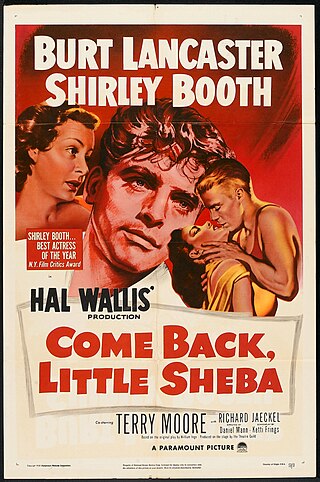
Come Back, Little Sheba is a 1952 American drama film directed by Daniel Mann in his directorial debut and produced by Paramount Pictures. The script was adapted by Ketti Frings from the 1950 play of the same title by William Inge. Starring Burt Lancaster, Shirley Booth, Terry Moore, and Richard Jaeckel, the film tells the story of a marriage between a recovering alcoholic and his frumpy wife, which is rocked when a young college student rents a room in the couple's house. The title refers to the wife's little dog that disappeared months before the story begins and whom she still openly grieves for. Booth, who had originated her role on Broadway and was making her film debut, won Best Actress honors at the Academy Awards, the Golden Globes, and the New York Film Critics Circle Awards.
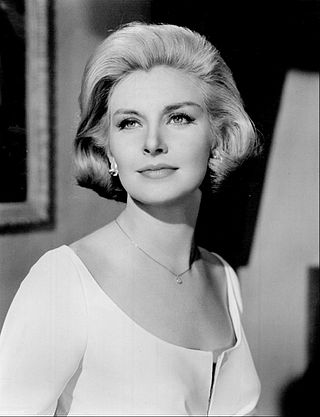
Joanne Gignilliat Trimmier Woodward is an American retired actress. She made her career breakthrough in the 1950s and earned esteem and respect playing complex women with a characteristic nuance and depth of character. Her accolades include an Academy Award, three Primetime Emmy Awards, a British Academy Film Award, three Golden Globe Awards, and a Screen Actors Guild Award. She is the oldest living winner of the Academy Award for Best Actress.

William Motter Inge was an American playwright and novelist, whose works typically feature solitary protagonists encumbered with strained sexual relations. In the early 1950s he had a string of memorable Broadway productions, including Picnic, which earned him a Pulitzer Prize. With his portraits of small-town life and settings rooted in the American heartland, Inge became known as the "Playwright of the Midwest".
Come Back, Little Sheba may refer to:
Come Back, Little Sheba is a 1950 play by the American dramatist William Inge. Inge wrote the play while he was a teacher at Washington University in St. Louis.

Richard Jaeckel was an American actor of film and television. Jaeckel became a well-known character actor in his career, which spanned six decades. He received an Academy Award nomination for Best Supporting Actor with his role in the 1971 adaptation of Ken Kesey's Sometimes a Great Notion.

Dame Sheila Cameron Hancock is an English actress, singer, and author. She has performed in both plays and musicals in London’s theatre scene, and her Broadway debut in Entertaining Mr. Sloane (1966) earned her a Tony Award nomination for Best Lead Actress in a Play.

Richard III is a 1955 British Technicolor film adaptation of William Shakespeare's historical play of the same name, also incorporating elements from his Henry VI, Part 3. It was directed and produced by Laurence Olivier, who also played the lead role. Featuring many noted Shakespearean actors, including a quartet of knights, the film depicts Richard plotting and conspiring to grasp the throne from his brother King Edward IV, played by Sir Cedric Hardwicke. In the process, many are killed and betrayed, with Richard's evil leading to his own downfall. The prologue of the film states that history without its legends would be "a dry matter indeed", implicitly admitting to the artistic licence that Shakespeare applied to the events of the time.

Trevor John Eve is an English actor. In 1979 he gained fame as the eponymous lead in the detective series Shoestring and is also known for his role as Detective Superintendent Peter Boyd in BBC television drama Waking the Dead. He is the father of three children, including actress Alice Eve. He is the winner of two Laurence Olivier Awards from the nineties in theatre.
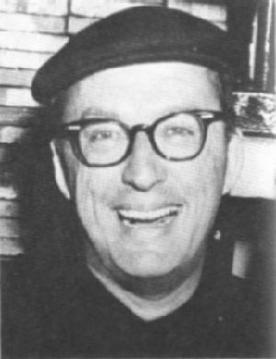
Daniel Chugerman, known professionally as Daniel Mann, was an American stage, film and television director.
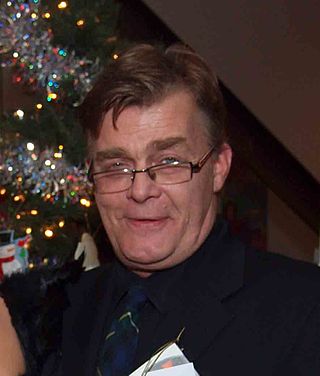
Nicholas Campbell is a Canadian actor and filmmaker. He is a four-time Gemini Award winner, a three-time Genie Award nominee, and a Canadian Screen Award nominee. He is known for his portrayal of the eponymous character, coroner Dominic Da Vinci, on the crime drama television series Da Vinci's Inquest (1998-2005) and its spin-off Da Vinci's City Hall (2005-2006).
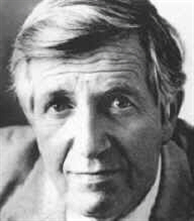
Andrew Bruce Boa was a Canadian actor, who found success playing the token American in British films and television, usually playing military types. Boa's most recognizable film role is in The Empire Strikes Back (1980) as General Carlist Rieekan. On television, his most notable role is probably as the brash, plain-speaking American guest, Mr. Harry Hamilton, in the Fawlty Towers episode "Waldorf Salad".

Laurence Olivier (1907–1989) was an English actor who, along with his contemporaries Ralph Richardson and John Gielgud, dominated the British stage of the mid-20th century. He also worked in films throughout his career, playing more than fifty cinema roles. From 1935 he performed in radio broadcasts and, from 1956, had considerable success in television roles.
Laurence Olivier Presents is a British television anthology series made by Granada Television which ran from 1976 to 1978.

Q Planes is a 1939 British comedy spy film starring Ralph Richardson, Laurence Olivier and Valerie Hobson. Olivier and Richardson were a decade into their fifty-year friendship and were in the process of staging a theatrical version of Othello, with Richardson in the title role and Olivier as Iago, when this film was made.
Silvio Narizzano was a Canadian film and television director who worked primarily in the United Kingdom. His directorial credits included the critically acclaimed films Georgy Girl (1966), Loot (1970) and Why Shoot the Teacher? (1977), which brought Narizzano several accolades, and television dramas like ITV Play of the Week, Zero One, Court Martial, Come Back, Little Sheba, Staying On, and The Body in the Library. He was nominated for four BAFTA Awards, winning once for Best Drama Series.
Play of the Week is a 90-minute British television anthology series produced for the ITV network by a variety of companies including Granada Television, Associated-Rediffusion, ATV and Anglia Television.
The Triple Crown of Acting is a term used in the American entertainment industry to describe actors who have won a competitive Academy Award, Emmy Award, and Tony Award in the acting categories, the highest awards recognized in American film, television, and theater, respectively. The term is related to other competitive areas, such as the Triple Crown of horse racing.














